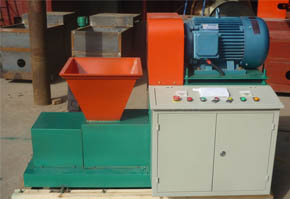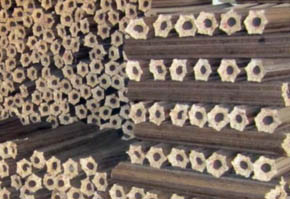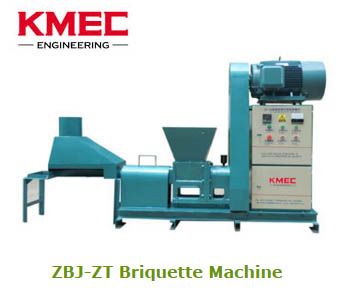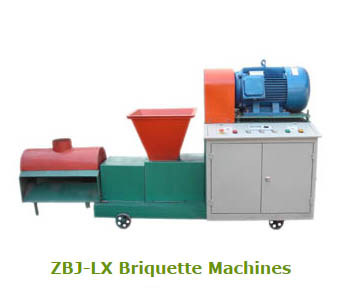The Emergence and Thriving of Briquette Machine and Briquette Plant
Sawmill waste is a big problem especially in urban cities. These wastes are burnt openly which is causing environmental pollution. The wastes can be converted to wealth thereby providing jobs for many unemployed citizens. A briquette is a block of compressed combustible energy carrier suitable for heating. Briquettes are made from waste materials such as old newspaper, sawmill wastes or partially compressed biomass waste. They are largely used as fuel instead of charcoal, firewood or coal. The burning of briquettes depends on the materials used for making them. Briquettes are largely combustible materials made from loose or low density wastes but compressed together into a solid. The compression leads to a product of higher bulk density, uniform size and shape. In African, the sawmilling industries generate a lot of wastes especially wood sawdust and plank shavings but do not have a proper means of disposing them. These wastes are burnt in the open air causing environmental pollution and contributing to global warming yet wasting energy the can be converted into useful power. Increasing demand for alternative energy sources aside from charcoal and petroleum products as well as waste disposal challenges has lead to increased interest in the production of briquettes. Since the raw materials for briquettes are loose and low density, the production of briquettes should be able to withstand long distance transportation, multiple handing and long time storage. At the beginning of 19th century, sawdust briquettes were made with tar or resins as the binder, but could not gain importance at that time due to relatively higher costs compared to wood and charcoal.


The
briquette machine is a single extrusion die screw press. It consists mainly of driving motor, screw, die, belts and the housing with a hopper. The belt transmits power from the motor to the screw through the pulley. When the motor is started, raw materials are fed into the machine through the hopper; the raw materials are compressed in the barrel, and extruded through the die. During operation, the rotating screw takes the material from the hopper through the barrel and compressed it against the die which forms a build up of pressure gradient along the screw. The screw continuously forces the materials into the die. Pressure is built up upon the screw rather than in a single zone as in the piston type machines. Briquette machine is mainly used in processing agricultural residues like almond shells, groundnut shells, rice husk, saw dust, peanut shells, corn cob and other biomass materials into solid briquettes, which can be used by human to replace the fossil fuel. The briquettes compressed by the briquette machine are highly compacted and poss high calorific value. Hence it is ideal for usage in open fires, boilers and furnaces. The briquettes have the same burning effect like charcoal but don’t produce any harmful gas.
Some people may know
briquette machine and briquette plant at large, but others not. Actually many a person once asked the emergence and evolvement of briquette machine and briquette plant.
People have been using biomass briquettes in Nepal since before recorded history. Besides, across African region, plenty of household users make homemade briquettes from their small quantity of wood waste. As we can tell from the vast territory of forest and Savanna, African people do possess abundant materials for making briquettes. Though inefficient according to the abovementioned usage, the burning of loose biomass created enough heat for cooking purposes and keeping warm. The first commercial production plant was created in 1982 and produced almost 900 metric tons of biomass. In 1984, factories were constructed that incorporated vast improvements on efficiency and the quality of briquettes. They used a combination of rice husks and molasses. To this stand, it is proved that Industrial Revolution galvanized the transformation of energy pattern from low efficiency and sporadically domestic use to large-scale industrial production. Therefore, the spring of advancement in briquette machine came to light and since then people concerned attached more importance to purchases of briquette machine and other related equipment.


Apart from the above, demands for charcoal also stimulated the evolvement of briquette machine from which charcoal production can be supplied raw material---biomass briquettes. Speaking of briquette machine per se, structures of the briquette press also derived in a various way. The needs for charcoal were well connected with the creation of screw type briquette machine. To date, the evolvement of the briquette press is still under way. Consequently, one of the evolvements refers to the change in driving force for briquette machine. Both the screw type briquette machine and the stamping briquette press are driven by motors, however, the
hydraulic briquette machine as its name suggests adopts hydraulic system as the power source. Because demands for driving force change from one to another, we cannot just stick to either one of them.
Naturally, designs of briquette plant shall be based upon adoption of briquette machine, the primary part of a plant. As we mentioned in another article that hydraulic force performs more stable yet with relatively lower yield. And then the application of auxiliary equipment will be altered to match the specific. You can choose a briquette plant as per the quantity of raw material you possess or the one you can garner. Alternatively, driving force may be another factor in your decision.
Different shapes of briquette are also offered according to Kingman briquette machines and
briquette plants.
--------------------------------------------------------------------------------------
We would like to make a detailed comparison between screw type briquette machine, mechanical stamping briquette machine and hydraulic briquette machine so that you will comprehend the three types of briquette machine well.



